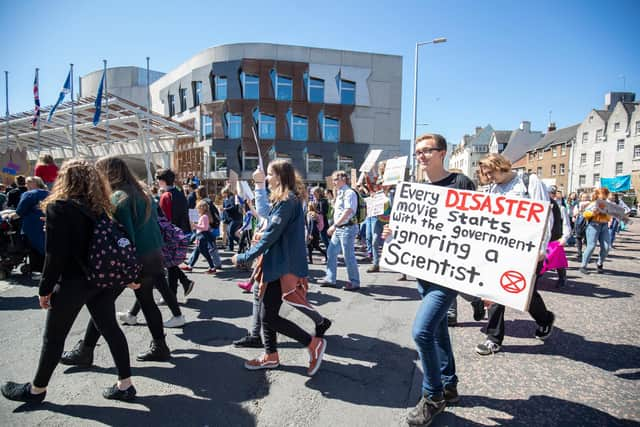Climate change: How Scotland has achieved much to celebrate in the last five years – Dr Richard Dixon
But on the eve of the election, it is worth pausing to remember that the last five years have seen some remarkable progress, with credit due to many individual MSPs who have listened and acted to get better decisions and better legislation.
On climate, who can forget 25,000 people marching through Edinburgh in September 2019 to rally outside Parliament, resulting in a big, last-minute tightening of the targets in the new Climate Act?
Advertisement
Hide AdAdvertisement
Hide AdThe last five years also saw 60,000 people say no to fracking and nearly 40 protest groups campaigning across the country, leading to Parliament voting to ban fracking, then an official moratorium on fracking and eventually a policy ban, despite a legal challenge from global firm Ineos.
On air pollution, a low-emission zone is up and running in Glasgow and there is a commitment to at least three more. More broadly on transport, a commitment to phase out sales of petrol and diesel cars and vans was made, and then strengthened by advancing the deadline to 2030.
This was joined by an impressive and challenging commitment to reduce kilometres driven by car by 20 per cent by the same date. And a new Transport Act gave powers to councils to set up workplace charging schemes and run bus companies. Friends of the Earth walked out of an official steering group on air pollution because it was talking a lot but doing nothing, two years later we helped write the new air pollution strategy.
On the transition out of fossil fuels, we have a very long way to go, but the political parties now talk the language of Just Transition, with MSPs agreeing to duties on it in law and the government’s Just Transition Commission that has just reported on its two years of work.


In local politics we have been working away for years to try to shift the over £1 billion of council pension money that is in fossil fuels, and Glasgow City Council has just voted to set course to rid the biggest of Scotland’s 11 funds of fossil-fuel investment.
Covid scuppered plans for a Circular Economy Bill but a deposit-return scheme for drinks’ bottles and cans is being created and the government has realised it can ban things, starting with plastic straws, microbeads and cotton bud sticks, and with more to come.
Covid has also helped us create new things though, including the Just and Green Recovery Alliance, which brings together groups from across civil society to press for a better Scotland as we come out of the pandemic, their agenda reflected in the discussions in parliament.
Trying to get big solutions to urgent problems out of a parliamentary system can be very slow and frustrating. Of course there is a huge amount more that needs to be done in the next five years, but let’s remember to celebrate the big changes that have happened over the last five.
Advertisement
Hide AdAdvertisement
Hide AdDr Richard Dixon is director of Friends of the Earth Scotland
A message from the Editor:
Thank you for reading this article. We're more reliant on your support than ever as the shift in consumer habits brought about by coronavirus impacts our advertisers.
If you haven't already, please consider supporting our trusted, fact-checked journalism by taking out a digital subscription.
Comments
Want to join the conversation? Please or to comment on this article.